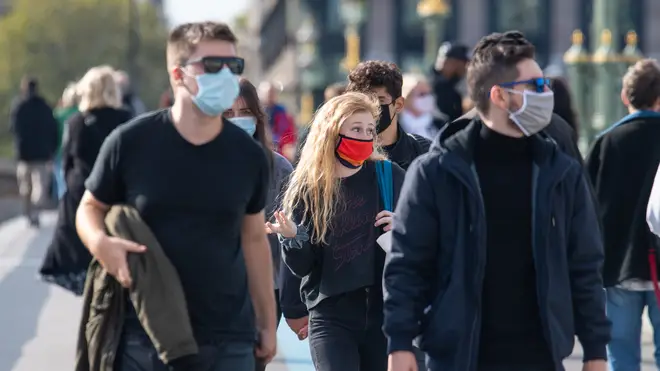
Matthew Wright 7am - 10am
1 October 2020, 00:01 | Updated: 1 October 2020, 06:08

The spread of coronavirus in England may be slowing down, a new study has found, sparking hopes that new measures to stem the number of new cases are working.
According to the largest Covid-19 study in England to date, infections rose significantly across the nation before England's R number - the rate of infection - dropped to around 1.1
The study also shown that around one in 200 people were infected with the virus, according to early results.
The director of the study, conducted by Imperial College London and Ipsos Mori, said the government's and the public's efforts to control the virus could be working which, he added, confirms the need for such measures.
Nearly a third of the British public have been under some form of restriction since the initial lockdown.
The programme saw more than 80,000 participants tested in England between 18-26 September. It examined the levels of infection in the general population by screening more than 150,000 volunteers each month over a two-week period.
Read more: PM warns of 'critical moment' as he urges public to stick to rules
Read more: Scientists say Covid-19 is 'not under control yet'

Boris Johnson warns of further measures if coronavirus advice ignored
Preliminary results from the study's fourth report - published on Thursday - revealed that roughly 55 people per 10,000 tested positive for coronavirus.
This represented an increase on the 13 per 10,000 in the previous instalment recorded between 24 August and 7 September.
The results published on Thursday suggest around 411,000 people in England had Covid-19 in the relevant time period, meaning just over one in 200 people were infected at the time.
People aged between 18 and 24 showed the highest rates of infection in the study - with one case per 100 people - while infections rose seven-fold in people aged over 65 from 0.04% to 0.29% compared to the last report.
The findings also showed that the north-west of England, where there have been numerous additional local restrictions, had the highest levels of infection while cases in London rose five-fold from 0.1% to 0.49%.
Read more: UK records 7,108 coronavirus cases and 71 deaths in last 24 hours
Read more: Boris Johnson's father Stanley pictured shopping without face covering

Top scientist "concerned" by PM's coronavirus briefing
Ipsos Mori and Imperial's final instalment of the study - with findings of all 150,000 participants tested between 18 September and 5 October - will be published next week.
Professor Paul Elliott, director of the programme at the university's School of Public Health, said: "While our latest findings show some early evidence that the growth of new cases may have slowed, suggesting efforts to control the infection are working, the prevalence of infection is the highest that we have recorded to date.
"This reinforces the need for protective measures to limit the spread of the disease and the public's adherence to these, which will be vital to minimise further significant illness and loss of life from Covid-19."

PM calls for a 'willingness to make sacrifices' during coronavirus briefing
While the study found that the R rate has decreased from 1.7 to 1.1, scientists say this could imply a level of infection deceleration "but with considerable uncertainty".
Half of the volunteers who tested positive for Covid-19 did not have symptoms at the time of being swabbed or the week before, but the study added that this did not mean they did not later develop symptoms.
The study, commissioned by the Department of Health and Social Care, also found people of Asian and black ethnicity are twice as likely to have coronavirus compared to white people.
Kelly Beaver, managing director of public affairs at Ipsos Mori, said: "The continuing support of the public by taking part in the study is something we remain immensely grateful for.
"The number of participants gives this study the robustness and thoroughness which marks it out as world-leading."
Listen & subscribe: Global Player | Apple Podcasts | Google Podcasts | Spotify